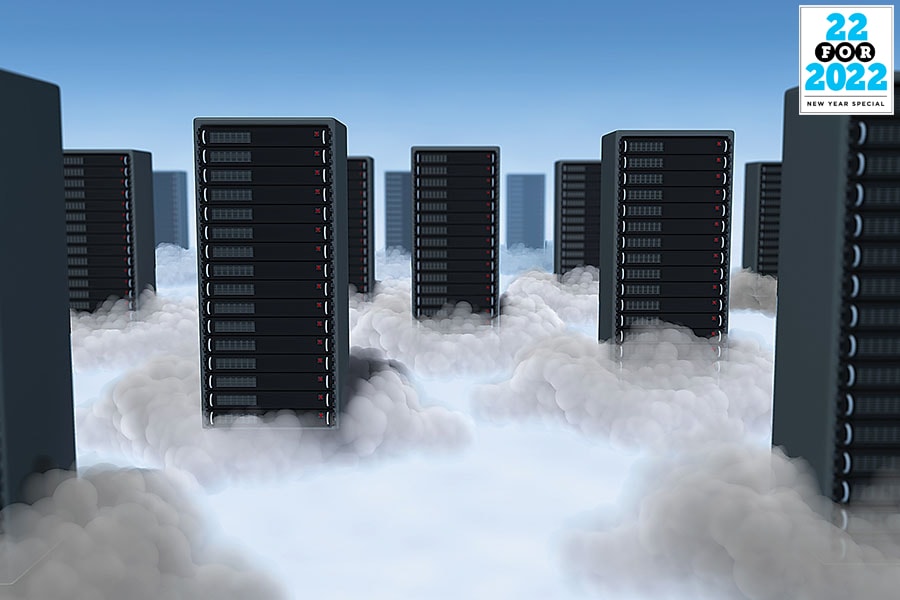What is certain is that we are in a period of unprecedented velocity of inter-disciplinary fertilisation of hitherto considered disconnected fields. For example, genetics and neuroscience are leading to the construction of information engineering and artificial neural networks in computing.
Much of it is due to digital, which is one diverse-yet-inter-operable, constantly evolving family of technologies enabling continuous availability of data, systems, applications and business processes. Such architecture allows enterprises to completely reimagine different aspects of their businesses. Now that is something different from the past.
- We have got at least a 10-year leap on digital and data. Enterprises will continue to invest in digital technologies to find new ways of growth, efficiency, innovation, resilience, safety and security.
- Business leaders will strike a balance between innovation and optimisation. Digital strategies will drive where, what, and how to compete. This will also include leadership approaches to managing people who will be working in increasingly digital ways on multiple things at the same time.
- While process maturity drove the efficiencies hitherto, organisations will focus on data maturity to make intelligent insights 24x7 and find new ways of extending their capabilities and market segments. Everything will be looked at being applicable for a billion-plus people and as global platforms.
- Companies will develop all new processes embedding smart facility technology to enable remote operations supporting hybrid work models, redefining work processes that will improve sustainability, business continuity, occupant experiences and operational performance.
- We will see ‘teams of the future’. We all have been used to staffing projects with individual roles thus far. We need to think about forming teams… agile teams with specific competencies, capabilities that will deliver the required rapidly with the necessary velocity and reliably. Enterprises will look for such proven teams rather than individuals.
![]()
- Left-to-right model of product development will be replaced by the right-to-left, that is end-user needs and their desired ‘experience’ of feeling, buying, using and servicing will drive more and more of product development and not just packing more features into the product. In fact, removing features from products (no-frills) with a thrust on experience and simplicity will be seen as differentiators.
- 5G is advancing and 6G is in the works. M2M communications and computing on the edge of the sensors and networks are going to bring life to things. The way the end-users will operate and use the applications is going to change significantly. In fact, I see that the so-called ‘systems of records’ will get all they require through data streams or feeds from the emerging ‘systems of experience’, and people may not enter any transaction data manually at all, as we look into the future. While we need touchless in the front, the backend is more likely to become contactless and invisible as well.
- The homegrown data centre in the largest of institutions and the government will continue to move ground in favour of hyper-scalers. The journey to cloud will keep getting reimagined new technologies will emerge to push the boundaries of cloud nativity, interoperability and low latency.
- Science and humanity skills like art, design, ecology will all become essential and more relevant for technology implementation.
- Advances in micro processing power will enable three-dimensional chips and quantum chips that will drive better programming, designing chips with specialised circuits that will perform certain functions for an industry better leading to the onset of domain computers—as in telecom computer, banking computer etc.
- Quantum cryptography is more likely to power the world of security and privacy. Any attempt to observe a quantum system inevitably alters it, thereby protecting the secrecy, confidentiality, and non-repudiated nature of information exchange.
![]()
- Web 3.0 will bring together AI (artificial intelligence)-driven services, decentralised data architectures and edge computing. AI will make us feel understood, decentralised data architectures and edge computing, along with the rise of 5G, will enable data streams to be pushed to the systems of record and the focus will be largely on systems of experience.
- Next generation of drones and robots can avoid collisions and flight path obstacles with bi-directional detection and provide indoor and outdoor flights with autonomous sense. For example, drones and robots will automate the monitoring, inspection, and maintenance of critical infrastructure such as pipelines, power lines and transportation systems, and ensure their responsible usage.
- Augmented reality which mixes virtual reality imagery will seamlessly integrate touch, voice and gestures. It is possible to create digital twins of everything that is physical and simulate its behaviour.
- Agriculture and farming will get more than their share of technology. Farms will be factory-like with a view to increase yield and make it sustainable. We will see robot tractors, robot harvesters and drones and satellites to monitor how a crop is doing. Much of the irrigation can be through grids of pipes laid alongside rows of crops rather than the sprinkler systems. Soil monitoring will control these pipes automatically. And for the pesticides and fungicides that need to fall upon the foliage rather than the ground, robots guided by drones will be the ones to do the job. Seeding soil with bacteria that fix nitrogen from the atmosphere will reduce the need for fertilisers. The consequence will be higher yield and higher income for the farmers, and will help the planet feed itself.
- Online education and telemedicine have become mainstream. The health care datasets are large enough that sophisticated machine learning will augment many interventions such as reliable monitoring of vital signs in ICUs to reading diagnostic images and performing the most complex of surgeries. Doctors and software engineers will make health care technology that is reliable and one that will align to the way the physicians think. Truly, engineers can become the new doctors!
- States will reinvent themselves as masters of new technologies, both digital and physical, as their citizens leave for jurisdictions like cryptocurrencies to the peer-to-peer exchange of other goods and services online. This is likely to drive central banks to create digital currencies which are likely to gain wider adoption over the next five years.
- The application development lifecycle methodologies will embrace ‘no code and low code’ platforms and gain further maturity. It is likely that the typical coding, testing and deployment activities that happen in this area will be significantly augmented by micro-bots and cobots.
- It is quite likely that IT services businesses become SaaS (software as a service) like allowing enterprises to consume technical services. This would entail the productisation of IT services offerings, and be prepared for ‘crowd sourcing’-like approaches. B2B sales and procurement processes would emulate B2C ones as millennials assume charge of these functions in organisations.
The writer is COO and executive director of Tata Consultancy Services

 New technologies will push the boundaries of cloud nativity, interoperability and low latency
New technologies will push the boundaries of cloud nativity, interoperability and low latency

